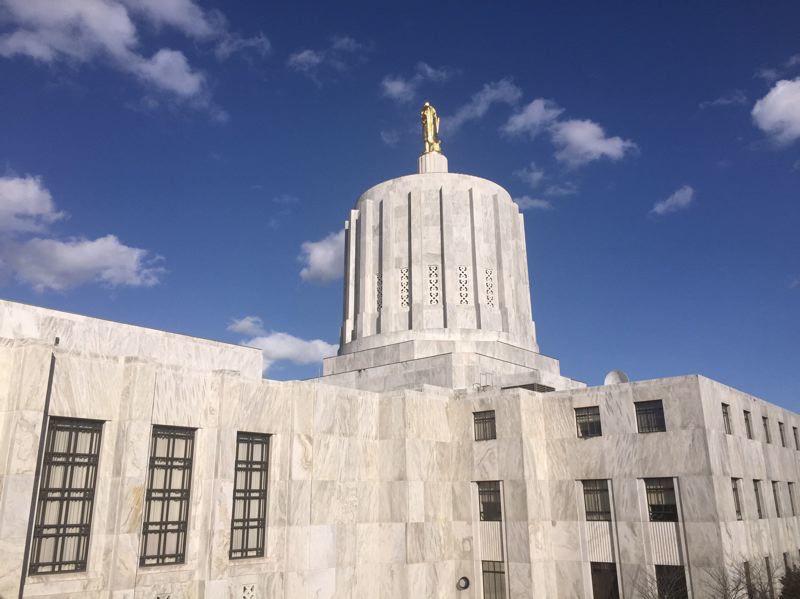Oregon political notebook: Battles move on from redistricting
Published 5:15 pm Monday, October 4, 2021

- The Oregon State Capitol.
The drawn-out fight over political redistricting has sucked most of the oxygen out of any other political news over the past two weeks. While waiting for any lawsuits against the maps that would push the finalization of districts into early 2022, the rest of the political world did not stop spinning.
Booze on ballot drive back on
A renewed drive to allow sales of hard liquor in grocery markets was launched Monday. The Oregon secretary of state confirmed it had received three proposed initiatives for the November 2022 election.
The move comes just under two weeks after two previous proposals submitted in June were withdrawn by the sponsors. Signature drives to put the issue on the ballot have fallen short twice before.
Lauren Johnson, chief executive of Newport Avenue Market in Bend, one of the official chief co-sponsors of the initiatives, said supporters are confident the time is right. “We’re really excited to take this first step and get this on the ballot next year,” Johnson said.
The efforts have been backed by the Northwest Grocery Association. The three proposals offer plans ranging from allowing all hard alcohol to be sold in markets, to limiting sales to boutique distilleries. Backers have previously said they will see which gets the best public response during the signature drive and then focus on getting one on the ballot. Currently, nearly all off-site hard liquor sales are through state liquor stores. The initiatives, which would change Oregon statutes, would require 112,020 valid signatures to make the ballot. Petitions will begin circulating after the secretary of state reviews the submissions.
Slow to file
House Speaker Tina Kotek,D-Portland, announced just before Labor Day that she’s running for governor in 2022. She’s raised just under $184,000 while spending just over $22,000 so far.
Treasurer Tobias Read announced Sept. 27 that he too will seek the Democratic nomination to succeed Gov. Kate Brown, who is barred by term limits from another term. Read has raised just over $383,000 and spent just under $155,000.
What neither has done: File for the office.
Kotek and Read are not among the 11 candidates for governor who have filed statements of candidacy with the Secretary of State’s office. Others have moved ahead on the required paperwork. The latest is Bud Pierce, who signed up to run for governor in 2022. Pierce was the GOP nominee in 2016 who lost the special election to Gov. Kate Brown.
It’s not like the deadline is looming. Candidates have until March 8, 2022 to get in, get out, or switch which office they are seeking.
The candidate filings aren’t just for governor. Overall, 56 candidates have filed for a variety of positions ranging from district attorney to county commissioner.
Candidates for House, Senate and congressional seats must wait until the Oregon Supreme Court approves the redistricting maps or hears any legal challenges. It’s a complicated calendar that won’t start playing out until next month. Candidates will have to go on faith that the maps will eventually be what’s used, pick a district, and start a fundraising campaign. Any official filing for office would come later.
Meanwhile, the money is ready
Filing for offices does not prohibit anyone from raising money to run for the office. Registering a political action committee with the secretary of state is a completely different function, and one that could be started much earlier. There may be just 11 people who have filed for governor, but there are already 19 campaign finance committees for the state’s top job.
Even that process is one that favors the dawdling candidate. Officeholders who already have fundraising committees from earlier runs for different offices simply have to amend their PAC to change the office the money is to be spent pursuing. Kotek’s campaign committee dates back to an unsuccessful House bid in 2004, then was amended when she ran for a neighboring district where she was successful and has served in the House since 2007. On Sept. 2, the committee was amended to run for governor.
Read’s committee has come full circle. It was opened in 2005 for a possible bid for governor, amended for a successful 2006 run for House District 27, then again in 2016 for treasurer and now Sept. 27 for governor.
The two lists — official candidates and candidates with campaign finance committees — aren’t a full representation of the race next year. Others have signed up for neither. An example: New York Times columnist Nicholas Kristof, who is on a leave of absence from the paper to consider a bid for Oregon governor. Despite several national articles about his possible run and much prognostication in political circles of whether the writer who grew up in Yamhill County could win a closed Democratic primary, not much concrete work has been seen on a campaign. Kristoff has neither filed for the race or started a candidate committee to officially raise funds.
Bend House freshman gets top party post
In a sign of the importance of the bulging beachhead that Democrats have established in Central Oregon, Rep. Jason Kropf, D-Bend, was appointed to House leadership halfway through his first term.
Kropf will be one of five assistant House majority leaders. The position is the fourth ranking spot among the 37 House Democrats. Kropf defeated incumbent Rep. Cheri Helt, R-Bend, ending a string of five straight GOP victories in a district with a growing Democratic voter registration majority.
Kropf told the Oregonian newspaper on Monday that he will pay $4,500 in fines levied by the secretary of state for a six-month delay in reporting $45,000 in “in-kind” campaign contributions from the Oregon Education Association’s PAC.





